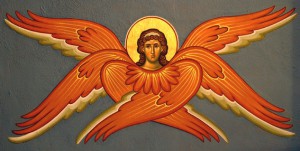A friend recently e-mailed me and he said that reading my blog is “like drinking sparkling water while pulling nose hairs.”
Well, this is going to be one of those sparkling water ones without the pulling of nose hairs. Despite the seemingly-boring topic of this post, the Offertory of the Mass, I’m going to make a tall promise: What I show you on the Offertory of the Mass will transform your weekly worship into something new, interpersonal, meaningful and even thrilling if you enact it, as Mega-Churchy as that promise sounds.
The offertory is the part of the Mass after the homily when the priest prepares the altar for the sacrifice. In sung Masses, the offertory prayer is sung. In the sung Latin Mass (TLM) the offertory prayer is sung by the choir and whispered by the priest. In the vernacular Mass (Novus Ordo, say, in English) it’s sung by the priest.
Then, the altar is prepared.
Normally, people see the offertory as essentially the “intermission ” of the Mass. That’s why you use this time to talk quietly about the homily, scratch your wife’s back, read the bulletin, check your texts, use the bathroom, correct your kids, wonder if you should give 1% or a 2% of your income in the offertory basket. Ok, one nose-hair part.
If we only knew what was really about to happen. The Mass is the re-presentation of the entire Last Supper and murder on Golgotha to the point that every Mass is as real as if you took a time machine back to Calvary at the consecration. This is true, whether there’s good or bad music/homilies. Yes, the consecration is indeed the most underrated part of the Mass.
But the second most underrated part of the Mass is the Offertory. Here’s why: The Mass is also an entire ecosystem of death and new life in the supernatural organism of the mystical body of Christ (the Church) for the life of the world—everyone from your family to a pagan you’ve never met.
There’s a modern day mystic (and possibly stigmatist) in Bolivia named Catalina Rivas. I believe her private revelations from Jesus and Mary have the approbation (or at least allowance) of the Bishops of South America. Mary, the Mother of God, walks Catalina through the Mass, and today I want to highlight what Mary shows Catalina about the Offertory. It’s worth reading the long quote, with Mary’s quotes in bold font:
A moment later the Offertory arrived, and the Holy Virgin said: “Pray like this: (and I repeated after Her) Lord, I offer all that I am, all that I have, all that I can do. I put everything into Your Hands. Build it up, Lord, with the little thing that I am. By the merits of Your Son, transform me, God Almighty. I petition You for my family, for my benefactors, for each member of our Apostolate, for all the people who fight against us, for those who commend themselves to my poor prayers. Teach me to lay down my heart as if on the ground before them so that their walk may be less severe. This is how the saints prayed; this is how I want all of you to do it.”
Thus, this is how Jesus asks us to pray, that we put our hearts as if on the ground so that they do not feel its severity, but rather that we alleviate the pain of their steps.
Suddenly some characters, whom I had not seen before, began to stand up. It was as if from the side of each person present in the Cathedral, another person emerged, and soon the Cathedral became full of young, beautiful people. They were dressed in very white robes, and they started to move into the central aisle and, then, went towards the Altar.
Our Mother said: “Observe. They are the Guardian Angels of each one of the persons who are here. This is the moment in which your guardian angel carries your offerings and petitions before the Altar of the Lord.”
At that moment, I was completely astonished, because these beings had such beautiful faces, so radiant as one is unable to imagine. Their countenance was very beautiful with almost feminine faces; however, the structure of their body, their hands, their height were masculine. Their naked feet did not touch the floor, but rather they went as if gliding. That procession was very beautiful.
Some of them were carrying something like a golden bowl with something that shone a great deal with a golden-white light. The Virgin Mary said: “They are the Guardian Angels of the people who are offering this Holy Mass for many intentions, those who are conscious of what this celebration means. They have something to offer the Lord.”
“Offer yourselves at this moment; offer your sorrows, your pains, your hopes, your sadness, your joys, your petitions. Remember that the Mass has infinite value. Therefore, be generous in offering and in asking.”
Notice this shortened version of the prayer that Mary asks us to pray at the Offertory:
Lord, I offer all that I am, all that I have, all that I can do. I put everything into Your Hands. Build it up, Lord, with the little thing that I am. By the merits of Your Son, transform me, God Almighty.
This is why this is the most interpersonal time during the Mass. As the priest is setting up the chalice, simply think or pray onto that altar every part of your life: every hope, every dream, every disappointment, every friend, every family member, every enemy, every act of love, every betrayal, every son, every daughter, every neighbor, everyone in prison, every Christian in Syria, everyone in ISIS, everyone working on Sundays, everyone who cut you off in traffic, everyone you learned about on the news, every circumstance at work, every medical problem, every financial problem, every mission, every marriage, every upcoming dentist appointment, every fearful anticipation, every hopeful anticipation, every physical suffering, every psychological suffering, everything you have, everything you are, everything you’re called to be, everyone you want to follow Christ. Think big. Your guardian angel can handle it.
As the priest is at the offertory, so also should you be. After you have thought of all those things, memorize now so you can say Lord, I offer all that I am, all that I have, all that I can do. I put everything into Your Hands. Build it up, Lord, with the little thing that I am. By the merits of Your Son, transform me, God Almighty.
Venerable Archbishop Fulton Sheen said those who have nothing to offer become “parasites on the body of Christ” when they receive Holy Communion.
But for those who take the Offertory seriously, here’s the final great news: At the consecration, not only is the bread and wine transformed, but so also everything else you prayed onto the altar: every suffering, every hope, every family member. This is the mystery of the immolation not only of the physical body of Christ, but the transformation of the Church—the mystical body of Christ.
If you want to change the world via the Mass, you don’t need to be an extraordinary “minister” of Holy Communion. You can live your baptismal, common priesthood for the glory of God and the salvation of countless souls if you pray the offertory ardently as you give your whole life to your guardian angel, who in turns presents it to the Blessed Trinity for the miraculous transformation of evil into good, and good into glorious.

